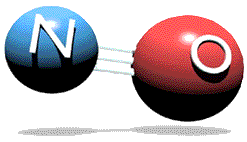This past week in our neurochemistry class, we discussed the role of Nitric oxide and the role it plays within the body. Nitric oxide (NO) is produced glial cells within our central nervous system. Glial cells serve the important role of inducing inflammatory processes in the body. Through activation by a host of endogenous and exogenous stimuli, glial cells produce bioactive compounds that are noxious for neuronal cell function. Nitric oxide is included within these bioactive compounds and is one of the most important molecules released by glial cells. Physiologically, NO serves as a neuromodulator and neurotransmitter in the brain, but in excess NO can exhibit harmful effects within our bodies including neuronal cell death. Through its prevalent social relevance, the use of nitric oxide as a pre-workout supplementation was discussed thoroughly and will be the topic of this blog post.
Pre-Workout Supplementation
In the late 1930s, a few individuals across the nation first began isolating whey from milk as a form of supplementation. By the 1950s, vitamins, minerals, and other isolates were included and sold in a powder form to aid in the nutrition of athletes. The 1980s brought about the fruition of the body-building craze and market for supplementation exploded for competitive lifters. Many types of supplements were introduced into the market, both legitimate and complete scams. In the early 2000s, the molecule Nitric oxide was introduced as a supplement for its vasodilation effects. The enlargement of the lifter’s veins was something tangible the lifter could see, and in turn, believed it was working. This physical manifestation of nitric oxide’s effects on the body made it become the premier component in a pre-workout supplement. Now the question remains, does supplementing with nitric oxide pre-workout work?
As a collegiate athlete, I have always been an avid lifter and used an array of supplementation while working out. In both high school and college, the use of pre-workout is quite prevalent and nitric oxide as a key ingredient was a favorite amongst my peers for a pre-workout supplementation. For many, the use of pre-workout gets them “in the zone” and results in better workouts day in and day out. Many claim that after using pre-workout supplements, as soon as you quit the intensity of your lifting drops, so obviously the pre-workout is aiding their lifting in their minds. Adding to the mix of factors, I was never informed of any potential side affects that could come from the use of nitric oxide supplementation, although through personal experience I didn’t see any positive effects. As a wrestler, my diet wasn’t always the best while competing due to the demand to cut of excess weight to be at a high level of competition. Supplementing with protein shakes supplied me with an easy option to obtain my daily protein/vitamin intake needs while sacrificing the weight that is associated with substantial food/liquid intake, although I cannot say that pre-workout supplementation aided in my performance as an athlete. When I used these supplements, I did indeed feel a “buzz” similar to what I would also experience after a few cups of coffee. So my personal conviction for the pre-workout supplements is that they really don’t work. They present the lifter with a feeling that they can associate with lifting and the removal of that feeling results in non-intensive lifts. Studies have shown that nitric oxide supplementation may aid a little to individuals not in shape but no consistent correlation has been presented within the realm of avid lifting. So it seems as if all this supplementation as a whole is a marketing scheme, the goal is to give an athlete a feeling that he/she associates with training to ensure the athlete’s continued use of their product. But, again, these are my personal convictions and fairly irrelevant as to what the public should know about nitric oxide.
Excess NO in the body
Production of NO is obtained through the overexpression of Nitric oxide synthase (iNOS). Abnormal iNOS induction influences the pathophysiology of detrimental consequences and particular neurological diseases including periventricular leukomalacia (PVL), Krabbe’s disease, X-linked adrenoleukodystrophy (ALD), and multiple sclerosis (MS). Mechanistically, the overproduction of NO results in the production of reactive nitrogen species (RNS). RNS are toxic forms of NO and the stress they present in neuronal cells is achieved through affecting mitochondria function, disrupting proteins, and inhibit the synthesis of DNA from ribonucleotides. In summary, excess NO disrupts normal cellular functions within our bodies, and resulting in negative side affects. Further experimentation and research is needed to clearly define the role NO plays in the nervous system in order to address its overproduction.
So back to the pre-workout supplementation… I feel that informing athletes of the side affects presented by nitric oxide is of utmost importance. As a victim to this marketing scheme, young athletes are lead to believe that the use of these supplements will increase their performance and their use of these products are not influenced by the negative side affects that can come from excess NO.
Nitric Oxide—Getting Pumped
